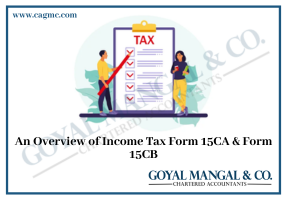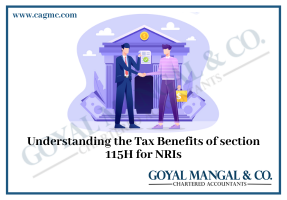GST Registration
Advantages
- Take input tax credit
- Make interstate sales without restrictions
- Register on e-commerce websites
- Limited compliance
- Less tax liability
Eligibility
- Having Turnover of more than 40 lakhs in case of Goods
- Having Turnover of more than 20 lakhs in case of Services
- Voluntary Registration
- Inter State Sales
- Non-Resident taxable person
How to get a GST Registration?
The name Goods and Services Tax (GST) itself reflects that it is a taxation system that takes into account – the goods and the services. This means GST is applicable on both the tangible goods as well as the intangible services while maintaining the balance of both the Central and the State Government independent revenues through a dual mechanism of GST.
On 1st July, 2017 marked the commencement of the GST regime that brought a comprehensive, multi-stage, and destination-based tax that is charged on every value addition. GST regime shall enhance transparency in the indirect tax framework and is expected to bring down the rate of inflation and cascading effect of tax. It will also be a hike to investment inflows, e-commerce and “Make in India” approach.
GST is based on the “One Nation One Tax” theme and consists of tax rate slabs that start with a minimum of 0% and extend till the highest of 28%.
Even today, people are not very much familiar with this tax mechanism and to get acquainted with the same they avail Chartered Accountant service.
The GST regime has made it mandatory for all the business entities engaged in buying or selling goods or services or both to get themselves registered under the provisions of the GST Act. Entities carrying out operations without GST Registrations are ineligible for GST collection from Consumers and they are not allowed to claim an input tax credit paid.
So, to claim the ITC and to collect the GST from customers, GST registration is compulsory. GST, therefore is a destination-based tax applicable on all transactions, involving supply of goods / services for a consideration.
GST Turnover Timit
GST registration is mandatory for casual taxable persons or persons making supplies through e-Commerce operators and non-resident taxable persons, irrespective of turnover limit. Such dealers must avail GST Advisory Service or take help from professionals like CA, CS and lawyers to understand what exactly the Act wants to convey.
“Casual taxable person” means anyone who occasionally undertakes transactions involving supply of goods or services or both in the course of business, whether as principal, agent or in any other capacity, in a State or a Union territory where he has no particular place of business.
Turnover Limit or service providers and goods supplier for regular GST Registrations are mentioned in following points:-
For Goods Suppliers: – As per the respective notification, registration under GST is mandatory for any person who is occupied in the exclusive supply of goods and whose aggregate turnover exceeds Rs.40 lakhs in a Financial year. The supplier must fulfill the below-mentioned conditions:-
- It should not be engaged in the supply of any services
- Must not be engaged in intra-state (supplying goods within the same state) supplies in the States of Arunachal Pradesh, Manipur, Mizoram, Nagaland, Puducherry, Meghalaya, Sikkim, Telangana, Tripura, and Uttarakhand
- Not involved in the supply of pan masala, tobacco or ice creams.
Turnover limit for GST registration falls down to Rs.20 lakhs and Rs.10 lakhs in case of non-fulfillment of the above-mentioned conditions and special category states, respectively.
This means when the supplier does not meet the above-mentioned conditions, it becomes mandatory for him to obtain GST registration when the turnover exceeds Rs.20 lakhs. For the northeastern and other states mentioned in the Act, the GST registration limit is Rs.10 lakhs.
GST registration consultants provide the platform for smooth & easy registrations under it. They take care of the different turnover limits which mandate the registration under the Act
Here is the list of the special category states under GST:-
- Arunachal Pradesh
- Assam
- Jammu and Kashmir
- Manipur
- Meghalaya
- Mizoram
- Nagaland
- Sikkim
- Tripura
- Himachal Pradesh
- Uttarakhand
The initial GST registration limits were raised in the 32nd GST Council meet for the supply of goods.Let’s have a quick glance at the initial threshold limits as well as new thresholds that require the mandatory registration of a firm under the Act.
| Aggregate Turnover | Registration Mandatory | Applicability |
| Initial Threshold – For the supply of Goods or Services | ||
| More than Rs.20 lakh | Yes – For Normal Category States | Till March 31, 2019 |
| More than Rs.10 lakh | Yes – For Special Category States | Till March 31, 2019 |
| New Limits – For Sale of Goods | ||
| More than Rs.40 lakh | Yes – For Normal Category States | From April 1, 2019 |
| More than Rs.20 lakh | Yes – For Special Category States | From April 1, 2019 |
| New Limits – For Providing Services | ||
| The threshold limits for Service Providers have remained unchanged. | ||
Explanation of Aggregate Turnover under GST
Aggregate Turnover under GST =(Taxable supplies + Exempt Supplies + Exports + Inter-State Supplies) – (Taxes + Value of Inward Supplies + Value of Supplies Taxable under Reverse Charge + Value of Non-Taxable Supplies).
It is a PAN-based calculation, so even if one person has multiple places of business, all must be considered and summed to arrive at the aggregate turnover.
Voluntary registration under GST
Any person whether natural or artificial regardless of business turnover can obtain GST registration at any-time. Many businesses that do not meet the aggregate turnover limit also get themselves registered under it. GST registration consultants can suggest you the best advice as to whether or not it’s beneficial to get your business registered under GST.
Major reasons for obtaining voluntary GST registration are:
- For improving the business credibility
- For satisfying the requirements of B2B customers
- For claiming the input tax credit benefits.
What are the documents required under GST?
If you wish to avail services for the GST registration, you need to study the document requirements for GST registration. For now, we can have an understanding of the documents that we need:
- PAN CARD OF THE BUSINESS OR APPLICANT: As the GST Registration is linked to the PAN of business. Hence, PAN is the most important document to be obtained by the entity before applying for GST Registrations.
- ADDRESS AND IDENTITY PROOF ALONG WITH PHOTOGRAPHS: Following can be admitted and submitted as Identity Proof such as (Passport, Voter ID card, PAN, Aadhar Card, Driving License) and; In case of Address Proof (passport, Aadhar Card, Driving License, Voters Identity Card and Ration Card) Further, the persons who mandatorily need to submit the above-mentioned documents are as follows:-
- Company – Managing Director, Directors and the Authorized Person
- Hindu Undivided Family – Karta
- Proprietary Concern – Proprietor
- Local Authority – CEO or his equivalent
- Statutory Body – CEO or his equivalent
- Trust – Managing Trustee, Trustees, and Authorized Person
- Partnership Firm / LLP – Managing/Authorized/Designated Partners (personal details of all partners are required to be submitted but photographs of only 10 partners including that of Managing Partner is to be submitted);
- Association of Persons or Body of Individuals –Members of Managing Committee (personal details of all members are required to be submitted but photographs of only 10 members including that of Chairman is to be submitted)
- Others – persons in charge
-
BUSINESS REGISTRATION DOCUMENT
All types of business entities need to provide their proof of business registration but in case of proprietorship, there is no requirement for the submission of the proof of business registration as the proprietor and proprietorship are considered the same. Also, the entities need to submit their charter document. Your GST consultant will guide you throughout the registration process and inform you whether or not you need a proof of business registration. -
ADDRESS PROOF FOR PLACE OF BUSINESS
In the GST Registration application, an address proof for all places of business is to be submitted. An array of documents can be used as address proof for the place of your business, you can avail guidance from https://www.gst.gov.in/ in case of any doubt. Following documents are admissible for GST Registration:-
- In case of Owned Premises - Copy of latest Property Tax Receipt or Municipal Khata or Electricity Bill.
- For Rented or Leased Premises- Copy of the valid rental agreement with a supporting document of ownership of the premises of the Lessor i.e. either copy of Latest Property Tax Receipt, Municipal Khata, Electricity Bill. In case of unavailability of the rental agreement or lease deed, an affidavit along with a supporting document in the possession of the premises like a copy of the electricity bill, etc can be used.
- SEZ Premises- In case the premises or the place of business is located in SEZ or the applicant is A SEZ Developer then all the necessary documents as issued and provided by the Government of India must be uploaded.
- Other Cases- Copy of consent letter of the owner of premises along with a supporting document of ownership of premises of the consenter like a copy of the electricity bill, Municipal Khata.
-
PROOF OF BANK ACCOUNT
Scanned copy of either following documents:-
- First and relevant page of Passbook
- The relevant page of bank statement
- • Cancelled cheque bearing the name of Proprietor or business entity, Bank Account No., IFSC, MICR, and Bank Branch details including code.2
- Other Cases- Copy of consent letter of the owner of premises along with a supporting document of ownership of premises of the consenter like a copy of the electricity bill, Municipal Khata.
Related Post

Section 462 Exemptions for Private Companies in General Meetings
Section 462 of the Companies Act, 2013 provides crucial exemptions to private companies and raises concerns

Understanding the Provision of TDS and TCS on Purchase & Sell of Goods
In thе Indian tax systеm two kеy concеpts govеrn tax collеction at sourcе, Tax Dеductеd at

An Overview of Income Tax Form 15CA & Form 15CB
Indian rеsidеnts making the forеign rеmittancеs arе rеquirеd to comply with the spеcific rеgulations sеt by

Understanding the Tax Benefits of section 115H for NRIs
Tax Benefits of section 115H for NRIs under thе Incomе Tax Act and 1961. This sеction
FAQs on GST Registration
The GST Registration must be applied within 30 days from the date of Incorporation in case of non individual person and in case of individual from 30 days of starting a business. If the turnover during the year at any point of time exceeds the prescribed limit then also it is mandatory to have a GST Registration.
Yes, one can register itself using the residential address as the place of business. You do not require any of the commercial address to get registered under GST.
Yes, it can be taken either way. GST Act holds no bar on the same.
Every entity registered under the GST whether through its act or voluntarily has to file GST returns regularly even though no transaction has been undertaken during the month or year, i.e. one has to file NIL returns as well.